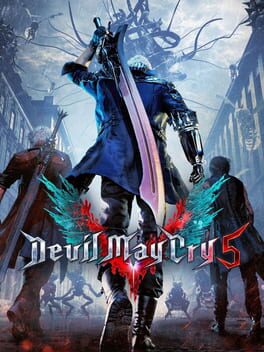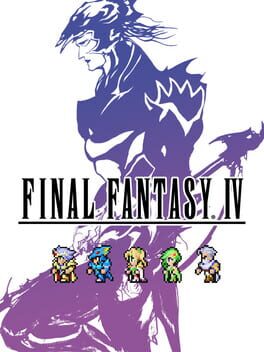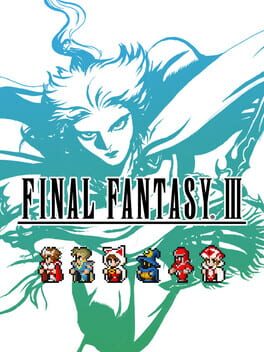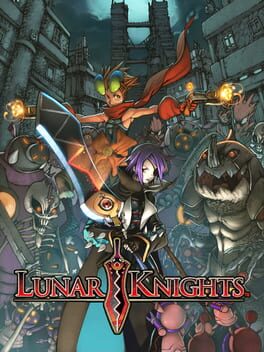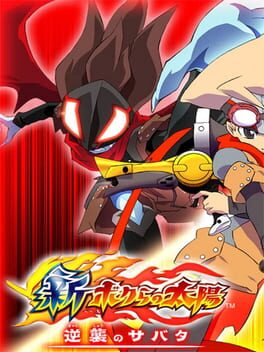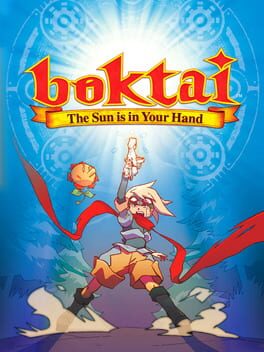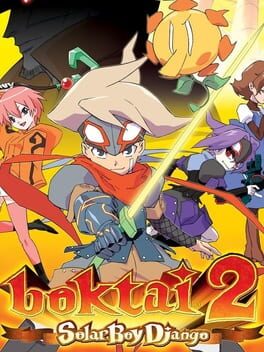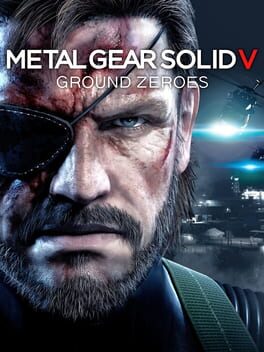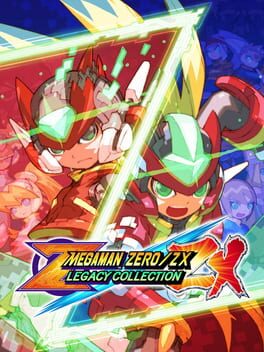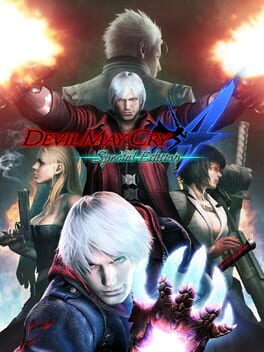Colby_Bryant
The best written game I've played, although admittedly I don't play a lot of narrative focused games. At times funny and poignant, with great music and art direction. Although it's a relatively small game it feels like I've only scratched the surface of some of its aspects with my first playthrough. The most I've vibed with a game since Metal Gear Solid V.
2019
Enemy design, boss battles, and overall gameplay are much better than 4. This is easily a contender for the best game in the series.
With that said I'm more interested in talking about what I don't like about this game. V is an interesting experiment that doesn't quite pan out. His reliance on his summons means he plays more or less like Nero if he did more damage but had a huge disconnect between his inputs and actually executing attacks on the targets you want. At least Nero never has to worry about his sword wandering around on the opposite side of the arena when he wants to do a melee attack. The disconnect between V himself and the actual gameplay is so great that they had to give him a finishing move with his cane so that he'd have something to do during fights. It's clear that the developers didn't have a lot of faith in V, as he only gets a couple of levels before plot reasons make him unplayable.
Speaking of missions, there's 20 missions in the game, some of them only consisting of boss fights, divided among three characters. The result is that it doesn't feel like you spend a lot of time with any of the characters. The result is that the game feels shorter than it really is. If the developers are going to insist on multiple playable characters with well developed move sets, they should take a page from Sonic Adventure's book and give each character their own campaign, maybe have a couple of final missions that unlock when you finish every character's story. Until then, I feel that DMC3 edges this one out as the series' best, despite that game's flaws.
With that said I'm more interested in talking about what I don't like about this game. V is an interesting experiment that doesn't quite pan out. His reliance on his summons means he plays more or less like Nero if he did more damage but had a huge disconnect between his inputs and actually executing attacks on the targets you want. At least Nero never has to worry about his sword wandering around on the opposite side of the arena when he wants to do a melee attack. The disconnect between V himself and the actual gameplay is so great that they had to give him a finishing move with his cane so that he'd have something to do during fights. It's clear that the developers didn't have a lot of faith in V, as he only gets a couple of levels before plot reasons make him unplayable.
Speaking of missions, there's 20 missions in the game, some of them only consisting of boss fights, divided among three characters. The result is that it doesn't feel like you spend a lot of time with any of the characters. The result is that the game feels shorter than it really is. If the developers are going to insist on multiple playable characters with well developed move sets, they should take a page from Sonic Adventure's book and give each character their own campaign, maybe have a couple of final missions that unlock when you finish every character's story. Until then, I feel that DMC3 edges this one out as the series' best, despite that game's flaws.
2021
The increased story focus is appreciated, although it's not as developed as a more modern RPG's would be. Gameplay wise the characters have more going on than their FF3 job system equivalents, although the frequency with which the game both gives and takes away party members can be a little annoying.
2021
Basically a better version of the first Final Fantasy. The job system is pretty neat but it isn't utilized to its full potential; outside of a couple scenarios you aren't going to be using many jobs outside of upgrading the basic jobs you get at the start. Visuals and sound are great as usual. The story isn't very deep but it's serviceable enough. Leaving the floating continent for the first time is a great moment.
2006
It's like a vampire had sucked the life out of Boktai. Puzzles, stealth, charm, and creativity are all gone, leaving combat, one of the series' weak points, the only thing left, and while there are a couple of minor improvements to said combat it isn't nearly enough to carry a whole game. The intuitive solar sensor is replaced by a weather manipulation system that requires exiting stages and navigating clunky menus to use, not that you'll ever need to, considering the game's braindead level design. Apparently feeling that Boktai 3's motorcycle sections weren't pointless enough the developers decided to one up themselves by adding space shooter segments that use the worst touch screen controls I've ever played on the DS. I stopped playing when I unlocked the final level, and while I'd usually feel guilty about reviewing a game I haven't finished I am confident in saying that unless you absolutely must play all the Boktai games to completion Lunar Knights isn't worth your or anyone's time.
It's honestly baffling to see a Kojima Productions logo upon booting up this game. Hideo Kojima himself never had all that much to do with the Boktai series as a whole, but it really brings to mind stories of how Kojima originally wasn't involved in the development of Metal Gear Solid 3 but he ended up taking over the project when the game they were making without him was allegedly turning out to be a real piece of shit.
It's honestly baffling to see a Kojima Productions logo upon booting up this game. Hideo Kojima himself never had all that much to do with the Boktai series as a whole, but it really brings to mind stories of how Kojima originally wasn't involved in the development of Metal Gear Solid 3 but he ended up taking over the project when the game they were making without him was allegedly turning out to be a real piece of shit.
The improved graphics are nice, and the gameplay combines some of Boktai 1's gun del sol customization with a streamlined version of Boktai 2's core mechanics, making what is possibly the series' best foundation for a great game. Unfortunately what is built on this foundation seems a little half assed. Puzzles and stealth are largely sidelined for more of a focus on combat, which was never the series' strong suit. Combat in general is trivialized by the trance system, which essentially functions as an "I win" button in most situations. The motorcycle levels are pure filler and the story is probably the worst it has been, featuring a pointless time travel subplot, clumsy callbacks to the first game that don't amount to anything interesting, and overly verbose characters who barely had anything worth saying to begin with. The world feels the smallest it has ever felt as well, consisting of about 6 disconnected levels with a hub town that has been reduced to a point and click menu.
It's true that Hideo Kojima's influence on Boktai has been overstated, but the further away the series drifts from its charming and clever first installment the more I feel that this series really could've used the master's touch. Then again, I suppose he was busy at the time with Metal Gear Solid 3, one of the greatest games ever made, so I can't be too upset, but it makes me wonder what could've been.
It's true that Hideo Kojima's influence on Boktai has been overstated, but the further away the series drifts from its charming and clever first installment the more I feel that this series really could've used the master's touch. Then again, I suppose he was busy at the time with Metal Gear Solid 3, one of the greatest games ever made, so I can't be too upset, but it makes me wonder what could've been.
If I had to describe this game in one sentence, I would say that Boktai is like the Legend of Zelda meets Metal Gear, a winning combination in my opinion. The solar sensor feature is fun and genuinely creative, and the abundant number of shorter levels provide compact chunks of gameplay perfect for a portable system, a lesson that would be carried over in Kojima's later game Metal Gear Solid: Peace Walker. This is the kind of game I wish I had as a kid during summer vacation, which is funny because this got released in North America in September. You can't release a kid's game that needs the sun like this in the Fall when school starts! What was Konami thinking?
The introduction of an RPG style leveling system plays completely counterintuitively when paired with the prior game's style of stealth gameplay, the game world in general feels noticeably smaller, and the increase in focus on narrative and characters only serves to thicken the series' already shallow story to more of a slog. I've heard it said that the game's solar sensor feature was the reason the series never took off, but playing this I'm starting to think we never got Boktai 3 because Boktai 2 was such a downgrade from the first game. Despite the misguided design decisions it still has enough of the first game's DNA to be a pretty enjoyable game.
I'm afraid it's been six years.
Incredible stealth action gameplay and a sophisticated story that ties together themes from throughout the series to capstone one of the greatest series in all of gaming. Replaying this six years later I have little doubt that Kojima Productions succeeded in crafting the game they wanted to make. It's a shame that the discourse surrounding this game has been haunted by the phantoms of behind the scenes drama and thwarted expectations. Audiences wanted more of Kojima the film maker, and were left bewildered by Kojima the game designer.
Incredible stealth action gameplay and a sophisticated story that ties together themes from throughout the series to capstone one of the greatest series in all of gaming. Replaying this six years later I have little doubt that Kojima Productions succeeded in crafting the game they wanted to make. It's a shame that the discourse surrounding this game has been haunted by the phantoms of behind the scenes drama and thwarted expectations. Audiences wanted more of Kojima the film maker, and were left bewildered by Kojima the game designer.
I remember reading a part of an interview where Hideo Kojima explains his original concept for Metal Gear Solid was a more nonlinear experience where the player could infiltrate a military base from whatever angle they chose. Ground Zeroes is probably the closest the series came to that vision.
As someone who played the Phantom Pain without ever having played GZ, I was at first a little put off by the smaller map size and the more limited array of weapons and abilities. However, after a little while of playing the game's handful of missions I came to appreciate its laser focus on providing a compact vertical slice of top notch gameplay. Aside from a couple of instances of buggy stealth detection from the AI, the only real flaw with this game is that it's basically just a demo. There was some controversy when GZ came out because the game sold for the retail price of $40.00 USD, a steep price for only a fraction of a game. With that said, Ground Zeroes is a demo that's more fun than many full $60 games, and I don't think I would have regretted it one bit if I payed full retail price for it on launch.
As someone who played the Phantom Pain without ever having played GZ, I was at first a little put off by the smaller map size and the more limited array of weapons and abilities. However, after a little while of playing the game's handful of missions I came to appreciate its laser focus on providing a compact vertical slice of top notch gameplay. Aside from a couple of instances of buggy stealth detection from the AI, the only real flaw with this game is that it's basically just a demo. There was some controversy when GZ came out because the game sold for the retail price of $40.00 USD, a steep price for only a fraction of a game. With that said, Ground Zeroes is a demo that's more fun than many full $60 games, and I don't think I would have regretted it one bit if I payed full retail price for it on launch.
The games are all ported perfectly and the option to rearrange the button layouts in the Zero games is a godsend, something that was sorely missing in the Mega Man X Legacy Collection. Playing the games back to back it's interesting to see how the series evolved in terms of game play, features, balance, and aesthetics. If I had to rank the games in terms of quality it would be something like this: Z2>Z3>Z4>ZX>ZXA>Z1
It plays mostly the same as 3 which is a plus. Nero's demon arm is a lot of fun as a weapon and an actually effective gap closer. The game takes a dip in quality when you start controlling Dante, whose more complicated weapons and style switching system don't really add much to this very short game. Other flaws seem to be series mainstays such as camera angle induced control awkwardness and the insistence on designing some encounters around the unfun spamming of otherwise superfluous ranged weapons. It's still a good game, but considering its obviously limited development resources it probably would have been better if they focused entirely on Nero.

